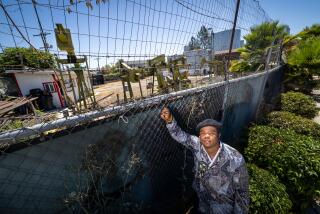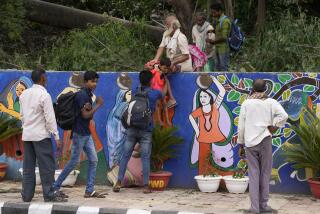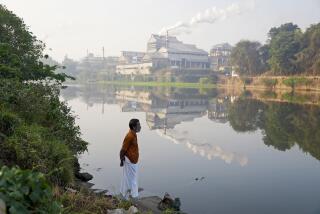Bhopal Marks 10th Anniversary of Gas Disaster
- Share via
BHOPAL, India — One decade after this city awoke in horror to its “night that never saw a morning,” its people on Saturday put their rage, grief and indignation on display, but also their discord, indifference and weary resignation.
To mark the 10th anniversary of the Bhopal gas disaster, the worst industrial tragedy in history, one victims group proclaimed a “day of national shame.”
After tense negotiations with police, some of its members were allowed to push past officers armed with bamboo staves and enter the grounds of the now idle Union Carbide plant.
Once inside the main gate, men and women from the Bhopal Gas Affected Women’s Industrial Organization put up a mock graveyard, swinging picks into the loamy soil and erecting oblong stones etched with names of some of the more than 7,000 people who Indian officials say have died over the last decade from exposure to the gas.
“This is a protest, not a memorial, that after 10 years the multinationals are still here,” Abdul Jabbar, the group’s organizer, said as his colleagues worked in the ebbing light of dusk. “The problem is both Union Carbide and the union of India (the Indian state). They are both responsible.”
The protesters left the plant grounds chanting “Death to Union Carbide! Death to the Indian government!” as thousands on the road outside cheered.
But for Bhopal residents who have observed many anniversaries of the gas disaster, Saturday’s events were filled with signs that apathy and resignation have grown with the years.
Rivalries among victims groups are still so strong that no common protest could be mounted. The march to the Union Carbide plant organized by the Bhopal Gas Affected Women’s group was the best attended of many events, but it drew 3,000 participants in a city of more than 1 million. And that number included 1,000 tribes people from the remote forests of the central Indian state of Madhya Pradesh, a section of the population that was unaffected by the Union Carbide discharge.
But in the dusty, twisting roads of Bhopal’s old city, the predominantly Muslim quarter that was especially hard hit by the leak of 40 tons of toxic methyl isocyanate, or MIC, on Dec. 2-3, 1984, the mood was somber.
Most merchants pulled down their steel shutters as a sign of mourning and solidarity. The government of Madhya Pradesh closed its offices for the day, and schools shut their doors.
“After 10 years, our sorrow has increased, not decreased, because people are still suffering,” said Tanwant Singh Keer, state minister in charge of relief for gas victims. “We have tried our best to wipe away the tears of the people. But still much remains to be done.”
Keer spoke at a morning interfaith prayer meeting where priests from the Hindu, Muslim, Sikh and Christian religions intoned prayers for the city’s dead.
“We’re remembering a night that never saw a morning,” state Gov. Mohammed Shafi Qureshi, the chief guest at the interfaith ceremony, told the hundreds who crowded into a hall to bow their heads. “New industries must take a lesson from Bhopal and take care that the tragedy is not repeated.”
However, environmentalists and victims groups complain that the lessons of their city’s frightful ordeal have not been absorbed and that India is still without a law like the U.S. Community Right to Know Act, which requires private companies to inform the public about toxic emissions into the environment.
Ironically, the environmentalists say, that U.S. law came about as a direct result of the Bhopal disaster.
“The American government is pressuring the Third World countries so when multinationals commit a crime, they don’t have to pay for the responsibility,” said Sadhna Karnik, leader of the Poisonous Gas Episode Struggle Front. She accused the U.S. government of callous indifference to the devastation wrought here by the Indian affiliate of an American company.
“It’s the 10th anniversary of Bhopal, and there hasn’t been even a statement or a concrete scheme for helping the victims,” she said. “They haven’t even sent us (former Union Carbide Corp. Chairman Warren) Anderson. He is the one man responsible and the one who should pay.”
An arrest warrant was issued by a Bhopal judge in March, 1992, for Anderson, who had been charged with culpable homicide five years earlier along with top officials of Union Carbide’s Indian affiliate.
But activists suspect that the Indian government is doing nothing to extradite the now retired CEO, and that fuels their conviction that mighty forces, including India’s leaders and one of the United States’ biggest corporations, are arrayed against them at a time when India wants more, and not less, foreign investment.
“We want punishment for this genocide,” Jabbar said.
On Saturday afternoon, scores of Communists hostile to foreign capital paraded through Bhopal’s streets, waving red flags. On the road outside the pesticide plant’s perimeter wall, children pelted a 12-foot-high, straw-stuffed effigy of “demon” Union Carbide with rocks. It was set on fire, and youths lustily beat the smoldering remains with poles.
At a nearby crossroad, members of a porters union held an interfaith “die-in.” Draped in a red shroud, a Hindu member of the union lay inert on logs placed in a pattern imitating a funeral pyre. Beside him, five Muslims, whose custom mandates burial of the dead, lay covered with earth, with their eyes closed.
Of the 5,000 unionized peasant workers in the city, 300 to 400 perished from the gas, and the health of survivors is impaired, said Pyare Mian, president of the Bhopal United Porters Union. He is demanding better medical care and adequate compensation, and he believes that the government is shedding crocodile tears about helping the suffering. Of about 600,000 personal injury claims, only a fifth have been processed, Madhya Pradesh Chief Minister Digvijay Singh said Friday.
“Twenty of my colleagues and myself will sit on hunger strike, and we won’t withdraw until people are paid compensation,” Mian vowed.
Indian officials said the highly toxic MIC gas, which killed 2,500 people in the first two weeks, continues to claim lives.
“People still get sick and die,” said Dr. Ajay Khare of the Bhopal-based Science Assembly.
State-supplied hospital care supposedly provided to gas victims is so slow and inadequate that many people spend up to four days before they can see a doctor, Khare said. In disgust, he said, many go to private practitioners--men and women who are expensive and who are often quacks.
In fresh black graffiti daubed on walls throughout the city, the Bhopal Gas Affected Women’s group demanded that the minimum compensation for gas victims be doubled to 50,000 rupees, or $810.
Activists say most claimants are being pressured to settle for the minimum amount and that the total awarded to people is only a fraction of the interest earned by the $470 million in compensation agreed to by Union Carbide in a 1989 out-of-court settlement.
In many respects, Saturday’s demonstrations seemed out of sync with fast-changing reality. On countless occasions, people chanted “Union Carbide out of India!” They were apparently unaware that the chemical and plastics giant, based in Danbury, Conn., sold off its controlling share in its Indian affiliate this fall.
More to Read
Sign up for Essential California
The most important California stories and recommendations in your inbox every morning.
You may occasionally receive promotional content from the Los Angeles Times.













